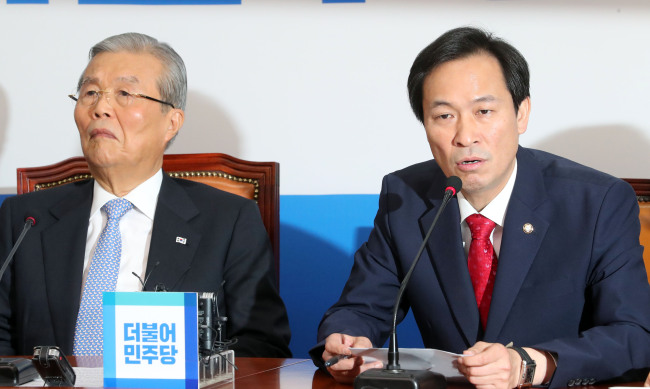Scandals bolster opposition push for graft probe body
By Yeo Jun-sukPublished : July 22, 2016 - 17:55
A series of bribery scandals involving top presidential aides and prosecutors are expected to boost opposition parties’ push for an independent agency to probe high-profile corruption, which has been stalled for 20 years by differences over its status and investigative authorities.
The main opposition, The Minjoo Party of Korea, said Thursday that it would move forward a bill to create an investigation body to exclusively deal with senior officials’ corruption. The centrist runner-up People’s Party and progressive Justice Party pledged to support the initiative.
“The bill is our top priority during the August parliamentary session,” said the Minjoo floor leader Rep. Woo Sang-ho.
“With the opposition majority in the National Assembly and some ruling Saenuri Party lawmakers endorsing the plan, approval of the bill is highly likely.”
According to the National Assembly Act, pending bills require a three-fifth quorum to clear the floor in the 300-member Assembly. Opposition party members and those considered to be in consent of the bills account for 169 seats, 11 short of the threshold line.
The main opposition, The Minjoo Party of Korea, said Thursday that it would move forward a bill to create an investigation body to exclusively deal with senior officials’ corruption. The centrist runner-up People’s Party and progressive Justice Party pledged to support the initiative.
“The bill is our top priority during the August parliamentary session,” said the Minjoo floor leader Rep. Woo Sang-ho.
“With the opposition majority in the National Assembly and some ruling Saenuri Party lawmakers endorsing the plan, approval of the bill is highly likely.”
According to the National Assembly Act, pending bills require a three-fifth quorum to clear the floor in the 300-member Assembly. Opposition party members and those considered to be in consent of the bills account for 169 seats, 11 short of the threshold line.

The draft bill provides that the anti-corruption agency must be an independent organization. Also, its leader is not required to have legal expertise but only “high reputation and extensive experience in his or her professional field.”
The Minjoo Party said that the eased qualification reflects their commitment to ending the practice of legal elites monopolizing key regulatory positions. The previous version had limited the qualification as someone who has practiced law for at least 15 years.
Also, at least half of the employees must be staffed with lawyers who do not work for prosecutors.
The scope of the investigation was expanded to top-ranking government officials including former presidents.
“(Including the presidents) means there is no exemption from the probe,“ said Rep. Back Hye-ryun of the Minjoo Party, one of the key initiators of the bill.
The requirement for launching the investigation was lowered. The agency will be obligated to kick off the probe when there is a request from a party with more than 20 members.
But some legal experts expressed concern that the system could be abused by belligerent politicians with partisan agenda, saying that the relaxed scope and authority of investigation open the way for massive politicized accusation.
“Technically speaking, former presidents are not classified as government officials,” professor Roh Myung-sun of Sungkyunkwan University Law School said in a media interview.
”The (eased) requirement may exponentially expand the scope of investigation.“
It was not the first time that lawmakers sought to introduce an exclusive graft probe agency. Since 1996, a total of nine such bills have been motioned but mostly ended in failure, due to ruling party disapproval.
Rep. Kweon Seong-dong, former prosecutor who now chairs the parliamentary legislation and judiciary committee, claimed that there is no need to create additional investigating authority.
“I don’t think there is enough rationale for pushing the plan,” Kwon said. “What we need to do is to refine or improve the current system. Plus, opposition parties in the previous Assembly asked for establishing permanent special prosecutors’ office, instead of building the anti-corruption agency,” he said.
But dissenting voices appeared to gain ground among the lawmakers outside of the faction close to President Park Geun-hye. The non-Park lawmakers, who plans to run for the party’s top post elected on Aug. 9, have said that they agree with establishing such organizations.
By Yeo Jun-suk (jasonyeo@heraldcorp.com)


![[Exclusive] Korean military set to ban iPhones over 'security' concerns](http://res.heraldm.com/phpwas/restmb_idxmake.php?idx=644&simg=/content/image/2024/04/23/20240423050599_0.jpg&u=20240423183955)




![[Pressure points] Leggings in public: Fashion statement or social faux pas?](http://res.heraldm.com/phpwas/restmb_idxmake.php?idx=644&simg=/content/image/2024/04/23/20240423050669_0.jpg&u=)










